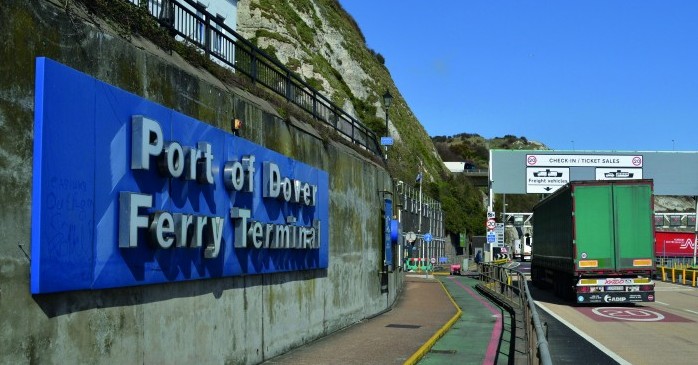UK farming organisations have warned that UK producers are not being allowed to compete on a level playing field, after the Government announced that new Brexit import controls and checks have been delayed by six months.
New EU checks on exports from GB came into force from day one, January 1, 2021, following the UK’s formal departure from the EU Single Market and Custom’s Union, causing additional costs, bureaucracy and delays for exporters of UK meat and dairy products.
The UK’s equivalent import checks were always going to be phased in, but today, Cabinet Secretary Michael Gove confirmed that they have been further delayed, meaning the need for health certificates for pork and other meat and dairy products has been put back from April 1 to October 1, while physical checks at border control posts will be introduced at the start of 2022, rather than on July 1, 2021.
Physical checks on live animals and low-risk plants and plant material will not take place until March 2022.
The NFU urged the UK and EU to work together to agree long-term arrangements as a matter of priority so trade can flow as smoothly as possible while new border infrastructure and systems are put in place.
NFU President Minette Batters said: “Since January 1 the UK’s agri-food sector has been struggling with the additional costs and burdens that moving goods to the EU now entails. It is therefore frustrating that our government is not taking a similar approach to the treatment of imports coming into Great Britain from the EU.
“Our exporters face additional costs and run the risk of financial losses if products are turned back or held up at the border, yet today’s announcement means that EU producers will maintain access to the UK market relatively burden-free for a considerable amount of time. It is crucial that we achieve a level playing field with pragmatic checks on imports and exports as quickly as possible.
However, Mrs Batters acknowledged that for certain food products this extension is a necessary step to ensure supermarket shelves remain well stocked.
She also described the decision to postpone checks on live animal imports for breeding until March 2022 as ‘a pragmatic solution whilst there are still no UK facilities able to host them at the border’.
NPA senior policy adviser Charlie Dewhirst said: “This is not remotely unexpected – the prospects of the Government being ready to introduce these checks have been looking remote for a while.
“Given the disruption to pork exports resulting from additional checks required by the EU since the start of this year, this clearly disadvantages British pig producers. We are not being allowed to compete on a level playing field with EU producers, who are gaining a clear competitive advantage.”
Food and Drink Federation chief executive Ian Wright said: “The FDF welcomes this sensible and pragmatic step to ensure that food and drink continues to flow, and allows manufacturers access to the inputs and ingredients they need in order to continue producing the full range of products for UK shoppers and consumers.
“Government must now use this time to do everything it can to support UK food and drink exporters who continue to face huge difficulties moving goods into the EU. They must work constructively with the EU to address barriers to trade by improving the implementation of the trade agreement and streamlining processes.”
COVID disruption
Mr Gove blamed COVID disruption and claimed the Government was responding to calls from businesses for more time.
“Last June, we announced a timetable for the phased introduction of controls on imports from the EU into Great Britain, to ensure businesses could prepare in a phased way,” he said.
“This timetable was based on the impacts of the first wave of COVID. We know now that the disruption caused by COVID has lasted longer and has been deeper than we anticipated. Accordingly, the Government has reviewed these timeframes.
“Although we recognise that many in the border industry and many businesses have been investing time and energy to be ready on time, and indeed we in Government were confident of being ready on time, we have listened to businesses who have made a strong case that they need more time to prepare.”
Revised timetable
This is the revised timetable for the introduction of controls:
- Pre-notification requirements for Products of Animal Origin (POAO), certain animal by-products (ABP), and High Risk Food Not Of Animal Origin (HRFNAO) will not be required until October 1, 2021. Export Health Certificate requirements for POAO and certain ABP will come into force on the same date.
- Customs import declarations will still be required, but the option to use the deferred declaration scheme, including submitting supplementary declarations up to six months after the goods have been imported, has been extended to January 1, 2022.
- Safety and Security Declarations for imports will not be required until January 1, 2022.
- Physical SPS checks for POAO, certain ABP, and HRFNAO will not be required until January 1, 2022. At that point they will take place at Border Control Posts.
- Physical SPS checks on high risk plants will take place at Border Control Posts, rather than at the place of destination as now, from January 1, 2022.
- Pre-notification requirements and documentary checks, including phytosanitary certificates will be required for low risk plants and plant products, and will be introduced from January 1, 2022.
- From March 2022, checks at Border Control Posts will take place on live animals and low risk plants and plant products.




